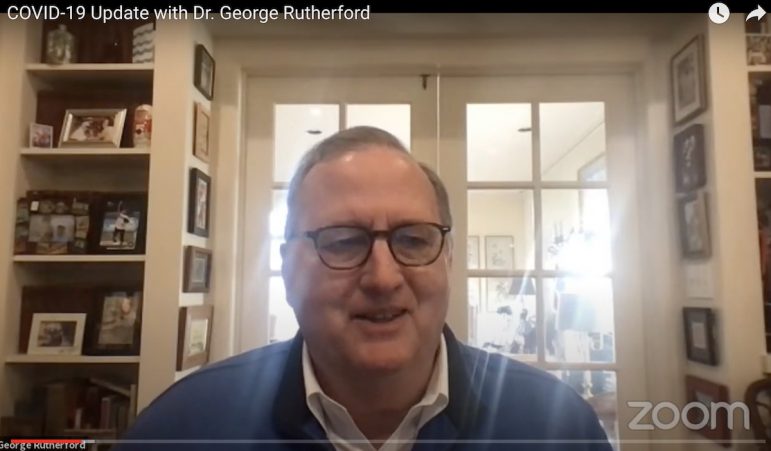A group of medical experts from the University of California at San Francisco and UC Berkeley expressed optimism this week that the COVID-19 pandemic could soon recede but argued that serious reform will be required on a global scale to respond to the next large-scale public health threat.
In an installment Tuesday of UCSF’s COVID-19 Path Forward discussion series, the medical experts suggested that the pandemic is not particularly close to being over despite vaccination progress.
Dr. George Rutherford, an epidemiology and biostatistics professor and the director of UCSF’s Prevention and Public Health Group, argued that the emergence of more-transmissible COVID-19 variants present a legitimate threat and are also causing case spikes in states like Michigan.

“I think there’s trouble ahead, frankly,” he said, noting that ongoing transmission is still a concern despite estimating that roughly 40 percent of the state’s population has some form of immunity due to vaccination or recovery from contracting the virus.
“We’re getting there,” he said of herd immunity, “but, again, the variants are of concern and ongoing transmission is of concern and the more that there’s ongoing transmission around the country, the more there’s going to be pressure here. I think we’re maybe at the 25-yard line.”
Rutherford and other experts participating in the discussions suggested the state could return to some form of pre-pandemic life by sometime in the summer as more people get vaccinated and spend more time outside, where transmission is less likely.
However, they acknowledged that a return to staying inside, working from home and strict public health guidance is certainly possible later in the year.
“I think, certainly in California, there’s a very good chance that we’re going to have a brief honeymoon and then it will get worse again,” said Dr. Stefano Bertozzi, a professor of health policy and management and dean emeritus of the UC Berkeley School of Public Health.
“I’m worried as we increase vaccination that we will be applying selective pressure to the virus to develop vaccine-escape mutants, and so there is a future in which this goes on for much longer than we hope,” Bertozzi said, adding that the pandemic should not be seen as ended until it is over around the world, not just in metropolitan parts of the country like the Bay Area.

Several panelists noted that the pandemic should serve as a catalyst for social change going forward, including seriously tackling the issues of homelessness, racism and classism that have been magnified over the last year.
“I think the pandemic has shown quite how dangerous it is to be homeless,” said Dr. Margot Kushel, a professor of internal medicine and the director of UCSF’s Center for Vulnerable Populations.
Kushel recalled that in the first months of the pandemic, she spoke with multiple COVID-19 patients that lived in small apartments with more than one dozen people in order to afford rent in the Bay Area.
Often, those patients and the people with whom they lived worked in jobs and industries that were deemed essential, and were thus more likely to be exposed to the coronavirus and transmit it to others.
“The question is, can we get the political will to make these changes,” she said. “Can we see beneath the tip of the iceberg and realize that we can’t have a healthy economy with a million housing units short that we have in California for extremely low-income households.”
Kushel pointed to state and federally funded initiatives like Project Roomkey as successful efforts in keeping unhoused residents sheltered and safe during the pandemic, but argued that much more is needed to ensure that society’s most vulnerable groups are protected during the next large-scale public health crisis.
“The amount of money it would take to house all Americans is a rounding number for the federal government, we just have never been able to get people interested in it,” Kushel said. “And there’s such an intersection with racism, so if there’s a glimmer of hope, it’s that it’s easier for us to make the case that we’ve been trying to make for years.”
For the generation of students that have been kept from the classroom by the pandemic, Rutherford said it remains unclear what the long-term effects might be, but argued that a vaccine suitable for adolescents and younger children will be necessary before schools can truly return to pre-pandemic operations.
The vaccines currently available are only available to people age 16 and up due to a lack of safety testing on younger patients. However, the members of UCSF’s panel agreed that adolescent and pediatric vaccines could be available by the fall.
“I think it’ll be a good year from now before (schools are) really recovered,” Rutherford said.
Bertozzi argued that, in addition to the need for social change, the waning of the pandemic will also be an ideal time to fortify global public health infrastructure before the next pandemic.
“I don’t think people realize that the World Health Organization has a budget much smaller than that of UCSF’s, and yet it’s responsible for the world,” Bertozzi said. “If this isn’t the time to take seriously the global infrastructure that’s needed to rapidly and effectively respond to this kind of threat, we will never do it.”
The experts agreed that humans will be more likely to come into contact with new coronaviruses and other zoological pathogens in the coming years as climate change pushes civilization and nature closer together.
For now, the panelists agreed that 2021 is already showing positive signs for the tail end of the COVID-19 pandemic.
“Hopefully we are heading toward the end and the path forward will be something that is positive,” said Dr. Bob Wachter, the panel moderator and chair of the UCSF Department of Medicine.
“We’ll come out of this scarred and with the memories of the people that we have lost and all of the harm, but also better and stronger with more of a focus on caring about each other and caring for each other.”
